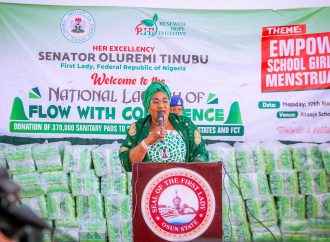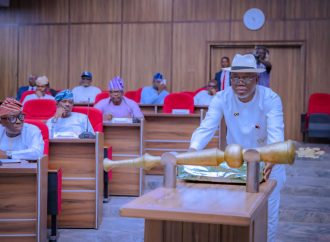Governors Back Bill On Reserved Seats For Women Nigerian state governors have expressed support for a proposed constitutional amendment seeking to create reserved seats for women in the National and State Assemblies. The endorsement, which has drawn national attention, marks a turning point in the decades-long campaign for gender equality in the country’s political representation.
Governors Back Bill On Reserved Seats For Women

Nigerian state governors have expressed support for a proposed constitutional amendment seeking to create reserved seats for women in the National and State Assemblies. The endorsement, which has drawn national attention, marks a turning point in the decades-long campaign for gender equality in the country’s political representation.
INTERPOL Arrests 11 ‘High-Level Members Of Terrorist Groups’ In Nigeria
The bill, currently before the National Assembly, aims to address the chronic underrepresentation of women in legislative and elective positions across Nigeria. According to its sponsors, the bill seeks to amend relevant sections of the 1999 Constitution to allocate a specific number of seats in both chambers of the National Assembly and in state legislatures exclusively for women.
The development followed extensive advocacy by women’s rights organizations, civil society groups, and gender-focused coalitions who argue that Nigeria’s political space remains male-dominated despite constitutional guarantees of equality. Data from the Inter-Parliamentary Union (IPU) shows that Nigeria ranks among the lowest in the world in female parliamentary representation—women occupy less than 5 percent of seats in the National Assembly and only a handful of positions in state legislatures.
At the 140th meeting of the Nigeria Governors’ Forum (NGF) held in Abuja on Thursday, several governors from both ruling and opposition parties publicly endorsed the proposal, describing it as a “necessary corrective measure” to ensure women’s voices are adequately represented in national decision-making.
In a communiqué issued after the meeting, NGF Chairman and Kwara State Governor, AbdulRahman AbdulRazaq, said the governors unanimously agreed that the time had come to institutionalize women’s participation in politics through constitutional reform.
“The governors acknowledge the persistent marginalization of women in elective offices and support legislative efforts to provide reserved seats for women in both federal and state legislatures. This will help create a more inclusive, balanced, and representative democracy,” the communiqué read in part.
AbdulRazaq, who also chairs the Nigeria Governors’ Wives Forum (NGWF) on Gender Equity, added that women’s political inclusion is not a privilege but a right that strengthens democratic governance. He noted that countries that have adopted similar affirmative action policies—such as Rwanda, Tanzania, and South Africa—have recorded remarkable improvements in governance quality and social development.
The proposed amendment has also gained support from the Federal Ministry of Women Affairs, the National Council of Women Societies (NCWS), and several non-governmental organizations working on gender rights. Minister of Women Affairs, Uju Kennedy-Ohanenye, described the governors’ endorsement as “historic,” urging lawmakers at the federal and state levels to demonstrate the same political will.
“This is the breakthrough we have been waiting for. For years, Nigerian women have been sidelined in politics due to cultural barriers, economic challenges, and institutional biases. The governors’ backing gives us renewed hope that the era of tokenism is ending,” she said.
If passed, the bill would reserve 111 additional seats for women—37 in the Senate, 74 in the House of Representatives, and a proportionate number in state assemblies. The reserved seats would exist alongside regular electoral seats, allowing women to also contest open positions.
Supporters of the bill argue that it is a pragmatic approach to correct systemic imbalance, noting that despite Nigeria’s commitment to the 35 percent affirmative action principle under the National Gender Policy, implementation has remained weak. They point to countries such as Rwanda, where women occupy over 60 percent of parliamentary seats, as examples of how reserved quotas can transform governance outcomes.
However, not everyone agrees. Some critics claim that reserving seats for women undermines meritocracy and could create a sense of entitlement. They argue instead for reforms that address barriers women face, such as violence in politics, lack of campaign financing, and limited access to party structures.
Responding to these criticisms, advocates insist that reserved seats are a temporary but necessary measure. “This is not about giving women unearned advantages,” said Dr. Hauwa Ibrahim, a human rights lawyer and member of the National Gender Equality Coalition. “It is about levelling the playing field and ensuring that half of our population has a voice in making the laws that affect them.”
Governors such as Douye Diri of Bayelsa, Babajide Sanwo-Olu of Lagos, and Alex Otti of Abia have also expressed personal commitment to implementing gender-inclusive policies in their respective states. Some states, including Ekiti and Kaduna, already have gender-friendly laws that could complement the proposed amendment if enacted.
Political analysts say the governors’ support could prove decisive in ensuring the bill’s success. Under Nigeria’s constitutional amendment process, any alteration must be approved by two-thirds of both chambers of the National Assembly and ratified by at least 24 of the 36 state assemblies. The governors’ influence over their state legislatures could therefore make or break the bill.
As the nation anticipates debate in the National Assembly, advocates have launched renewed campaigns urging Nigerians to support the bill. They argue that true democracy cannot exist without fair representation and that women’s inclusion will bring diverse perspectives, enhance accountability, and foster social justice.
With the growing momentum and unprecedented backing from state governors, the proposed reserved seats for women may finally move from aspiration to reality. If successful, it would mark one of the most transformative political reforms in Nigeria’s democratic history—ushering in a new era where women are no longer spectators but equal partners in leadership and governance.


















Leave a Comment
Your email address will not be published. Required fields are marked with *